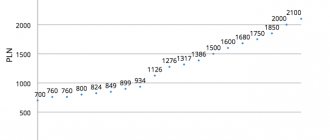Japan ranks third among the world's leading economically developed countries, behind only the United States and China. The Japanese automobile industry is one of the most powerful, and the production of electronics and computer equipment is the most innovative in the world. The production of robots, hybrid vehicles, medical, optical and measuring equipment is developing at tremendous speed in this country. It is not surprising that the capital of this country, Tokyo, is one of the richest cities in the world. High standards of living, including safety, health care and social protection, make Japan attractive to foreign professionals and investors.
Average salary in Japan
The average salary in Japan as of September 2021 has decreased compared to last year. If in 2021 the average Japanese person received 289,496 yen per month, which is equal to $2,706, then this year the monthly income is 284,518 yen or $2,671. As surveys show, with the fall in wages, the number of residents of this country dissatisfied with their income has increased. If in 2017 there were about 11% of them, then in 2021 there are already 64% of such citizens. Employees of Japanese companies are highly motivated financially, and they no longer like working in the same organization throughout their lives, where an increase in pay awaits them only after a promotion in a few years. They are ready to look for a higher-paying job and change their position and employer if they are offered more money for their work.
The average wage in this country has experienced quite serious fluctuations over the past half century, reaching a maximum of $7,865 in December 1997 and a minimum of $471 in February 1970.
Fluctuations in the average monthly salary after taxes in Japan over 10 years
Table
| Year | Salary, $ | Year | Salary, $ |
| 2010 | 2925 | 2015 | 2324 |
| 2011 | 2968 | 2016 | 2623 |
| 2012 | 3368 | 2017 | 2710 |
| 2013 | 2968 | 2018 | 2706 |
| 2014 | 2514 | 2019 | 2671 |
Average salaries by profession
The table shows average salaries in Japan by profession in yen and in US dollars. These are the latest official data from the Japanese Ministry of Health and Labor. Interestingly, in this country, the salary ratio is noticeably different from most countries in the world. Thus, programmers here are far from the highest paid profession in comparison with, for example, university teachers or journalists. And working as a janitor is much more profitable than working as a cashier or waiter.
| Profession | yen per year | dollars per year |
| Airplane pilot | 17 121 000 | 156750 |
| Doctor | 11 540 000 | 105650 |
| University teacher | 10 740 000 | 98330 |
| Lawyer | 10 360 000 | 94850 |
| Journalist | 8 140 000 | 74525 |
| Dentist | 7 400 000 | 67750 |
| Accountant | 7 200 000 | 65900 |
| School teacher | 7 100 000 | 62500 |
| Architect | 6 400 000 | 58600 |
| Engineer | 5 412 000 | 49550 |
| Pharmacist | 5 315 000 | 48670 |
| Stewardess | 4 780 000 | 43760 |
| Registered Nurse | 4 730 000 | 43305 |
| Programmer | 4 260 000 | 39000 |
| Salesman | 3 221 000 | 29500 |
| Social worker | 3 100 000 | 28340 |
| Driver | 3 100 000 | 28340 |
| Street cleaner | 2 905 000 | 26600 |
| Waiter | 2 780 000 | 25460 |
| Cashier | 2 495 000 | 22850 |
Salaries of representatives of various professions in Japan
A higher level of salaries is observed in the fields of sales, finance, law, education and medicine, and the higher the employee’s position and work experience, the higher his income. In the legal field, for example, a novice lawyer earns around $7,300, while an experienced international lawyer who has worked in this field for more than 10 years earns up to $34,000 per month. Traditionally, women's salaries in Japan are lower than those of men in the same positions. Some leadership positions cannot be held by women at all.
The labor market in Japan today is experiencing an acute shortage of qualified personnel who have an education in finance and speak foreign languages. Japanese companies in this area pay their employees much less than corporations with foreign participation, so there is an outflow of highly qualified specialists from local companies to their international competitors.
In the field of computer technology, on the contrary, a huge influx of specialists has led to the fact that the requirements for the professional training of candidates have become more stringent, and wages have been established at the level of the statistical average. Developers of mobile applications for Android and iOS are most in demand today. Computer game developers also make good money, and it looks like their jobs will only increase in the coming years.
A huge number of new cars coming off the production lines of Japanese manufacturers already have an electric motor under the hood. This allows Japan to enter the rapidly growing electric vehicle market, which experts say will grow from 3% to 20% in the next 7 years. It is not surprising that the demand for specialists with relevant skills is growing in the country, and due to their shortage, the auto industry is attracting professionals from other areas of mechanical engineering.
The production of semiconductors, which are in demand in electronics, microcircuits, LEDs, radio components and nuclear technology, is also strengthening its position. However, Japanese workers are more often hired by foreign companies working in this field, because local employers offer salaries a level lower.
Online trading and e-commerce have recently shown stable growth due to the development of the Internet space by entrepreneurs and large companies in Japan. This has led to an increase in demand for sales representatives, business development and sales managers, and digital marketers. In order to lure such a professional, companies offer a salary 30-40% more than at the previous place of work.
Teachers and medical workers are also well paid. Japan is especially happy to welcome specialists who come from abroad to teach English here.
The highest salaries are among deputies, lawyers and civil aircraft pilots.
Average monthly salaries in Japan by profession
| Job title | Average salary, $ | Job title | Average salary, $ |
| Deputy | 23000 | Pharmacist | 4000 |
| Advocate | 12500 | Courier | 3900 |
| Civil aviation pilot | 12700 | Nurse | 3500 |
| General doctor | 8800 | Programmer | 3300 |
| Professor | 8200 | Shop assistant | 3300 |
| HR manager | 8100 | Web Designer | 2900 |
| Sales Manager | 5900 | Bus driver | 2900 |
| Dentist | 5600 | Builder | 2700 |
| Research laboratory employee | 5500 | Designer | 2700 |
| School teacher | 5200 | Cook | 2700 |
| Translator | 5100 | Farmer | 2600 |
| Police officer | 4800 | Pastry chef | 2500 |
| Architect | 4800 | Office Manager | 2500 |
| Engineer | 4500 | Cashier | 2200 |
| Vet | 4500 | Farmer | 2100 |
| Civil servant | 4400 | Taxi driver | 2000 |
| Accountant | 4400 | Secretary | 2000 |
| Fisherman | 4100 | Office clerk | 1900 |
Minimum
Salaries in Japan are calculated based on annual income. But for the convenience of Europeans, monthly figures are given.
900 yen per hour ($8.1) is the minimum wage in 2018. The amount greatly depends on the region in which the rate is set. The highest prices are in Yokohama, Tokyo (958 ¥), Osaka (909 ¥). The lowest in prefectures: Nagasaki, Kumamoto, Okinawa, Miyazaki, Kagoshima, Oita - 737 ¥. Unskilled workers receive a minimum of $7 per hour. If you calculate the amount per month, it will be ¥146,987 ($1,336).
Salaries in Tokyo
The average monthly salary of Tokyo employees is the highest in the country and one of the highest in the world. In 2021, the net salary is approximately 334,371 yen per month or $3,139, which is comparable to the income of residents of cities such as Hong Kong, London and Paris.
Tokyo is home to the headquarters of many international corporations based in Japan. Among them are such giants as Sony, Honda, Nikon, Casio and many others. The Japanese capital is also one of the main financial centers in the world. It is also home to the Tokyo Stock Exchange, where shares of more than 3,500 local and foreign companies are traded daily. The most popular areas of the economy in the Japanese capital include information technology, software development, e-commerce and B2C sales.
The most popular employers in Tokyo
| Company | Average salary, $ |
| Rakuten Inc. – Japanese e-commerce site | 4085 |
| Amazon.com Inc. – an American company that sells goods and services via the Internet | 5400 |
| Toshiba is the largest Japanese manufacturer of household appliances, medical equipment and software | 3234 |
| Mitsubishi is a Japanese concern operating in the automotive and chemical industries. | 4992 |
Income taxes
In Japan, there are several mandatory types of taxes that are paid on any income: income tax, residence tax and insurance. For employees, amounts are deducted from their salaries by the employer, while others are required to independently calculate the amounts and file tax returns once a year. The interest rate is affected by the amount of income and the number of dependents (children, retired parents, disabled family members). If both spouses work, the family pays less in taxes than if only one worked.
Income tax is calculated on a progressive scale: from 10 to 50%. The maximum percentage applies to income of 30 million yen per year (from 18.5 million rubles). There is a prefectural tax (5-15%) and additional local deductions. There are 5 benefits and exemptions for each taxpayer.
The average earnings of Japanese people are described in this video:
They make good money in Japan, but they also have to pay high taxes. Doctors, aircraft pilots, and university teachers receive the highest salaries; low-skilled and young professionals earn the least.
Seasonal awards in Japan
Every year, most Japanese companies pay bonuses to their permanent employees. Employees of enterprises receive the summer bonus or Kaki Shoyo in June, and the winter bonus - Toki Shoyo - in December. The payment of such bonuses is not mandatory for employers, so the amounts are set by the companies themselves, and they also have the right to stop payments at any time without giving reasons. The amount of bonuses depends on the well-being of the employer: the better the company’s position in the market, the larger the bonus fund it has. Traditionally, the bonus is an amount equal to the employee’s salary for 3 months.
Minimum wage in Japan
There is no single minimum wage for everyone in Japan. It is established by the authorities of individual prefectures, revised and indexed in the fall.
At the end of 2021, the average minimum wage in Japan was 901 yen per hour. This is 596 rubles. Over the past 10 years it has grown significantly:
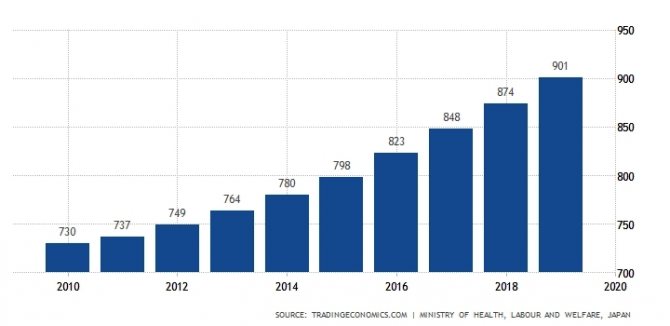
Growth predicted by Trading Economics macro models is 925 yen/hour by the end of 2021, 950 yen/hour in 2021.
In large industrial centers and the capital, the minimum wage is noticeably higher than in poorer regions. Screenshot from the official website of the department mhlw.go.jp:
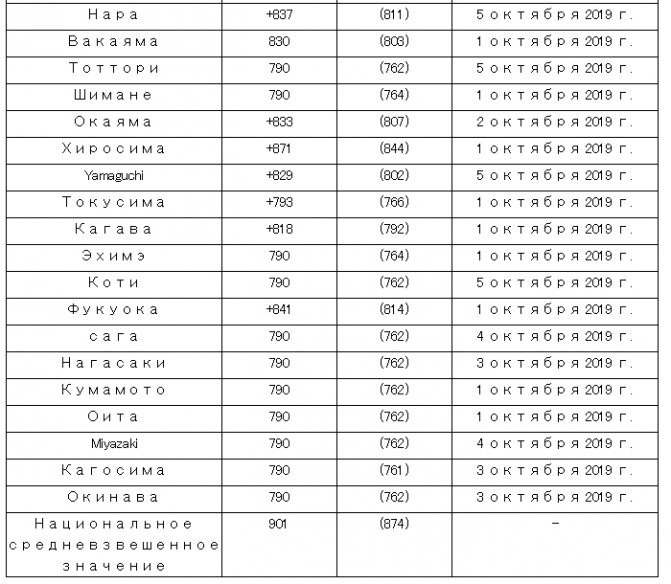
It is unknown whether the minimum wage will be revised this year; the crisis is making its own adjustments. In neighboring China there has not been an increase yet.
Taxes and social contributions
Salaries of the working population of Japan are subject to income tax. Failure to pay risks not only a huge fine, but also a prison term. The tax amount depends on the status of a resident of Japan:
- a taxpayer who is a citizen of the country and permanently resides here or has lived in the country for more than 5 years and is applying for permanent residence;
- a foreigner who has lived and worked in Japan for 5 years, but does not intend to stay here forever;
- A taxpayer who has resided in Japan for less than a year.
The first and second categories of citizens are required to pay taxes on all their income received both in their country of residence and abroad. Employees who have lived in the country for less than a year pay income tax only on everything they earn in Japan. Income taxes in Japan are calculated on a progressive scale, which means the tax rate increases as wages increase.
Table of income tax rates depending on the income of Japanese citizens
| Amount of income | Income tax |
| Up to $17200 | 5% |
| Up to $29200 | 10% |
| Up to $59200 | 20% |
| Up to $79600 | 23% |
| Up to $159,000 | 33% |
| Up to $354,000 | 40% |
| Over $354,000 | 45% |
In addition to state contributions, there are also local taxes, which are set at 10%. Amounts of income above those indicated in the table are subject to an additional tax of 2.1%. Non-residents of the country pay the state a fixed 20.42% of their income and their salaries are no longer subject to any taxes.
Along with income taxes, Japan's employed population pays various social contributions. Pension contributions amount to 18.30% of the employee’s monthly salary and are paid into the pension fund according to the following scheme: 50% of the amount is paid by the employee, and the remaining 50% by his employer. In Japan people retire at the age of 65, and those who have worked in this country and regularly paid the appropriate contributions for 10 years or more are entitled to receive it. Those who have worked in Japan for less than 10 years can only claim a lump sum refund of their contributions. Health insurance covers the costs of related care for employees. Like pensions, these benefits are split equally between the employee and his employer. Health insurance premiums vary from 9.6% to 10.6% depending on the prefecture. In the capital Tokyo, medical deductions are set at 9.9%.
Taxes in Japan

There are over 50 taxes and fees in Japan, their payment applies to employees, entrepreneurs and self-employed persons. Interest rates are set at the national, prefectural and local levels. The National Tax Agency and the local Tax Bureau are involved in regulating the tax system. The calculation procedure, application of interest rates, and payment terms are determined by Japanese regulations.
Taxpayers in the developed Japanese state are divided into 3 categories:
- Permanent residents are citizens who have lived in Japan for 5 years or more. They pay taxes on income received within the country and abroad. This also includes foreigners who intend to obtain Japanese citizenship.
- Non-permanent residents are persons who have been in Japan for more than one year without the intention of moving to permanent residence. Income tax is paid to the budget on income received in Japan.
- Non-residents are foreigners temporarily living in the country. A tax percentage is withheld from wages earned in Japan.
Salary tax or Income Tax will be calculated on a progressive scale according to salary levels. The following rates are set for 2021:
| Salary per year/in yen | Bid |
| · up to 1,950,000 | 5% |
| · from 1,950,000 – 3,300,000 | 10% |
| · from 3,300,001 – 6,950,000 | 20% |
| · from 6,950,001 – 9,000,000 | 23% |
| · from 9,000,000 – 18,000,000 | 33% |
| · from 18,000,000 – 40,000,000 | 40% |
| · from 40,000,000 | 45% |
To calculate taxable income, a deduction is made from wages according to the following scheme:
| Salary per year / in yen | Rates in yen |
| · up to 1,625,000 | 650 000 |
| · 1 625 001 – 1 800 000 | (income from work) x 40% |
| · 1 800 001 – 3 600 000 | (income from work) x 30% + 180,000 |
| · 3 600 001 – 6 600 000 | (income from work) x 20% + 540,000 |
| · 6 600 001 – 10 000 000 | (income from work) x 10% + 1,200,000 |
| · 10,000,001 and more | 2200000 |
To calculate your salary in hand, not only the individual income tax is calculated, but also:
- Insurance premium + pension contributions in the total amount of 15%.
- Resident tax is within 8%.
Tax amounts are reviewed by a government commission within 3-5 years. In 2021, an amount of 28-33% will be deducted from the average Japanese income into the budget.
Unemployment rate in Japan
Japan's unemployed working-age population is 2.2%, the lowest for the country in 20 years. Since 2010, the number of unemployed Japanese has been steadily declining. This is due to the rapid economic growth in the country, which requires more and more labor resources. Japanese companies are fighting for personnel, constantly improving the working conditions of their employees, who, aware of the growing number of offers on the labor market, are no longer afraid to defend their rights and change their place of work.
Fluctuations in the unemployment rate in Japan over the past 20 years
| Year | Unemployment rate , % | Year | Unemployment rate , % |
| 2000 | 4,7 | 2010 | 5,1 |
| 2001 | 5,0 | 2011 | 4,6 |
| 2002 | 5,4 | 2012 | 4,3 |
| 2003 | 5,2 | 2013 | 4,0 |
| 2004 | 4,7 | 2014 | 3,6 |
| 2005 | 4,4 | 2015 | 3,4 |
| 2006 | 4,1 | 2016 | 3,1 |
| 2007 | 3,8 | 2017 | 2,9 |
| 2008 | 4,0 | 2018 | 2,4 |
| 2009 | 5,1 | 2019 | 2,2 |
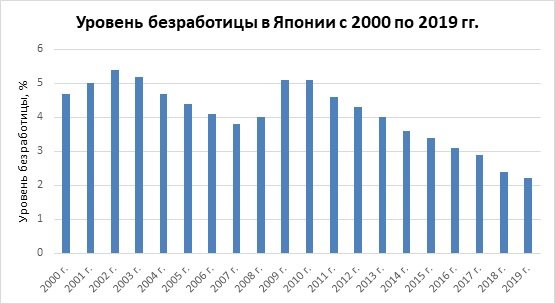
According to the UN International Labor Organization for 2021, unemployment rates vary greatly from country to country. Developing countries such as South Africa, India and Egypt have a fairly high level of unemployed population, reaching up to a third of all working-age citizens of the country. In some developed countries this figure is also quite high: in Greece, Italy, Spain, Finland and France. Compared to other countries in the world, the unemployment situation in Japan looks quite good. Only Monaco can boast that it has surpassed Japan in this indicator.
Unemployment rate in some countries of the world according to 2019 data.
| A country | Unemployment rate, % | A country | Unemployment rate, % |
| Australia | 5,2 | Netherlands | 3,4 |
| Brazil | 11,8 | Norway | 3,6 |
| Great Britain | 3,9 | UAE | 2,57 |
| Germany | 3,0 | Poland | 5,2 |
| Greece | 3,4 | Russia | 4,5 |
| Egypt | 17,0 | USA | 3,7 |
| India | 3,53 | Türkiye | 12,8 |
| Spain | 14,02 | Finland | 6,0 |
| Italy | 9,9 | France | 8,5 |
| Canada | 5,7 | Czech | 2,7 |
| China | 3,61 | Sweden | 6,9 |
| Mexico | 3,7 | South Africa | 29,0 |
| Monaco | 0 | Japan | 2,2 |
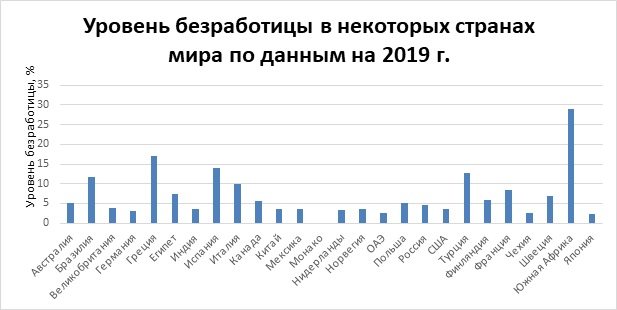
Minimum wage in Japan
As for the minimum wage in Japan, it varies from 18,000 to 200,000 yen/year. Converted to rubles, it will be from 9,000 to 102,000 per year. Place of residence also influences the level of the minimum wage. Note that a salary of 200,000 yen is considered a very low level of income by Japanese standards.
In Japan, the minimum level of hourly income is 900 yen, that is, 480 rubles. This minimum is established at the legislative level.
Cost of living in Japan
The cost of living in Japan is several times higher than in Russia. The largest sums of money are spent by the Japanese on paying for housing and purchasing food and basic necessities. They spend up to half of their income on this. The remaining 50% of the salary goes to the purchase of clothes and shoes, payment of utilities, transportation costs, as well as entertainment and sports.
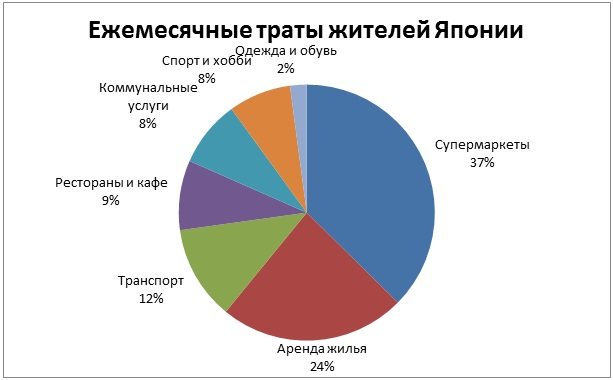
Salaries in Japan are among the highest in the world, but the cost of living here is also high. A third of the Japanese salary goes to paying rent and utilities. Of course, the cost of housing depends on the city and area in which it is located. For example, a one-room apartment in Fukuoka in the south of the country will cost $560 per month, and in Tokyo – already $1,163. It should be noted the high cost of Internet and cellular communications. Japanese people also spend a lot on food. Almost 40% of their income goes to buying food. After work and on weekends, the Japanese love to visit restaurants and cafes, so catering establishments are another significant expense item for the Japanese.
| Name | Cost, $ | Name | Cost, $ |
| Products | Services | ||
| Milk, 1 liter | 1,74 | Utilities (electricity, water supply, heating, garbage removal), 1 month, 2 room apartment | 189,37 |
| Bread, 500 gr. | 1,82 | Cellular connection, 1 min. outgoing call | 0,36 |
| Rice, 1 kg | 4,71 | Internet, 1 month | 44,47 |
| Chicken egg, 12 pcs. | 2,12 | Fitness club subscription, 1 month. | 81,99 |
| Cheese, 1 kg | 16,44 | Cinema ticket, 1 person. | 16,90 |
| Apples, 1 kg | 6,8 | Rental of property | |
| Bananas, 1 kg | 2,76 | 1 room apartment in the city center, 1 month. | 801,74 |
| Oranges, 1 kg | 5,26 | 1 room apartment on the outskirts of the city, 1 month. | 539,90 |
| Tomatoes, 1 kg | 5,43 | Clothes and shoes | |
| Potatoes, 1 kg | 3,72 | Jeans, 1 pair | 63,25 |
| Wine, 1 bottle. | 12,2 | Summer women's dress, 1 piece. | 39,95 |
| Tea bags, 200 gr. | 1,8 | Nike sneakers, 1 pair | 75,23 |
| Travel by transport | Men's leather shoes, 1 pair | 110,08 | |
| 1 trip in public transport | 1,97 | Eating out | |
| 1 month pass | 93,86 | Lunch at the restaurant, 1 person. | 8,35 |
| Taxi car delivery | 5,63 | Lunch at McDonalds | 6,38 |
| Taxi ride, 1 km | 3,94 | Cappuccino, 1 cup. | 3,67 |
| Gasoline, 1 l | 1,34 | Coca-Cola, Pepsi, 0.33 l. | 1,28 |
The Japanese are very frugal people. There is an unspoken rule in the country to save 25% of your earnings so that by the time you retire you will already have some savings, since pensions here are small. Due to the high cost of goods and services, the Japanese save on almost everything: they rarely use cellular communications, buy food at wholesale stores, carry lunches with them to work, and save on water and heating.
Average salaries in Japan as of 2021
In Japan, wages are paid in yen, which we will indicate in the table. It is worth noting that in Japan some types of professions are assessed completely differently than, for example, in Russia or Europe. For example, working as a programmer is not a highly paid profession. And working as a janitor is more profitable than, for example, working as a cashier. So what is the average income level in Japan, and how much can you earn per year depending on your professional skills?
- Auto mechanics – 322,500 yen/year.
- Architects – 533,350 yen/year.
- Accountants – 600,000 yen/year.
- Kindergarten teachers – 273,350 yen/year.
- Doctors – 961,650 yen/year.
- Guides – 255,850 yen/year.
- Maids – 249,150 yen/year.
- Wipers – 242,100 yen/year.
- Loaders – 270,850 yen/year.
- Journalists – 678,350 yen/year.
- Designers – 300,000 yen/year.
- Nannies – 283,350 yen/year.
- Cashiers – 207,500 yen/year.
- Couriers – 440,000 yen/year.
- Security guards – 311,750 yen/year.
- Social workers - 258,350 yen/year.
- Sellers – 268,350 yen/year.
- Programmers – 355,000 yen/year.
The average salary in Japan by profession ranges from 250,000 to 400,000 yen/year. If converted to Russian rubles, it will be approximately 130,000-205,000 rubles/year.
If we compare the average annual income by industry, we will see approximately the following picture:
- Medicine – 5,320,000.
- Production – 4,770,000.
- IT – 4,760,000.
- Real estate/construction – 4,210,000.
- Retail trade – 3,630,000.
[edit] Sources
- 『叛骨の宰相岸信介』 KADOKAWA, May 10, 2014, ISBN 978-4-04-600141-2, Kita Yasutoshi
- Study Commission Report on the Minimum Wage System (Ministry of Health, Labor and Welfare)
- [1]
- あなたの賃金を比較チェック|最低度
- National list of minimum wages by region Ministry of Health, Labor and Welfare
- 2013 4 18 日
- 」の「逆転現象」は解消されていない!-用いられる「生活保護基準」のウソ-(藤田孝典) — 個人 — Yahoo!ニュース
- あなたの賃金を比較チェック|最低度
- ↑ 9,009,019,029,039,049,059,069,079,089,099,109,119,129,139,149,159,169,179,189,199,209,219,229,239,249,259,269,279,289,2 99,309,319,329,339,349,359,369,379,389,399,409,419,429,439,449,459,469,47 Nationwide list of hourly minimum wages by prefecture starting 2021
- ↑ 10,0010,0110,0210,0310,0410,0510,0610,0710,0810,0910,1010,1110,1210,1310,1410,1510,1610,1710,1810,1910,2010,2110,2210,2 310 ,2410,2510,2610,2710,2810,2910,3010,3110,3210,3310,3410,3510,3610,3710,3810,3910,4010,4110,4210,4310,4410,4510,4610,47 特定最低賃金の全国一覧|厚生労働省
- ↑ 11,0011,0111,0211,0311,0411,0511,0611,0711,0811,0911,1011,1111,1211,1311,1411,1511,1611,1711,1811,1911,2011,2111,2211,2 311 ,2411,2511,2611,2711,2811,2911,3011,3111,3211,3311,3411,3511,3611,3711,3811,3911,4011,4111,4211,4311,4411,4511,4611,47 最低賃金制度
Ways to find work in Japan
First of all, you need to write your resume (CV) correctly. It must contain information about the applicant’s education, work experience and competitive advantages.
Japanese employers often disdain immigrants, so they are more willing to hire local applicants. Competition in the labor market is quite high. But there is still a chance of successful employment.
Finding a job in Japan can be done in several ways.
- Directly through the websites of well-known companies (Hitachi, SONY, Panasonic, Toyota, Mitsubishi, etc.). In the section with information about vacancies, you can leave your resume along with a cover letter.
- Through personal connections, if you have friends living in Japan or having experience working there.
- Locally in Japanese periodicals (Kansai Scene, Metropolis, Japanzine and The Japan Times).
- Through job sites. The most popular Japanese resources are Jobs in Japan, Daijob, GaijinPot, HAYS, Hiwork, The Japanitimes, Tokyo Connections. You can also use international recruiting portals (CareerJet, etc.).
- Through personnel centers. The most reliable are Hello Work (has many offices in almost every locality of the country, you can select Russian on the website) and Nishi Shinjuku Center (works with the support of the Ministry of Labor and Social Protection).
- As part of government programs to attract foreign specialists - through the Ministry of Internal Affairs and the Ministry of Education of Japan. One of the most popular is the Japan Exchange and Teaching Program for teachers, athletes and cultural figures.
- Graduates and students of universities in Russia and the CIS can undergo a paid internship.

What is the average salary in Tokyo
Japan is a country that has established itself in the international market as a state with high economic performance. The following factors contribute to this:
- high working capacity of the population;
- absence of economic crises for a long time.
The following can be said about the hard work of the population: a Japanese person comes to work for a company and works for it all his life. A standard working day lasts 8 hours; there are often overtime hours that result in a 12-hour shift. The hard work of citizens forces them to refuse long-term vacations and sick leave. That is, the Japanese sacrifice their rest and free time for the sake of their career, which is welcomed by management and contributes to career growth.
Tokyo is one of the highest paid regions in Japan by global salary standards. The capital of Japan is home to the headquarters of major enterprises such as Nikon, Sony, Fujitsu, Honda and many others that have proven themselves well in the global market. This country has a forty-hour work week. The average salary is approximately 340,000 yen, or $3,100 per month, and hourly wages in Tokyo range from approximately 958 yen. It should be noted that the salary of the average Japanese depends on the profession, as well as the position held. And although wages here are among the highest in the world, they are subject to a progressive tax, that is, the more you receive, the more you deduct. In Tokyo, as well as throughout the country, wages rise with age. Therefore, the older and more experienced a person is, the higher his salary.
The average salary for a man is 430,000 yen, or $3,500, while women working in office positions such as managers and mid-level executives earn about 272,000 yen, or $1,900.
Salary levels in Japan in 2021
Japan is a country with a strong economy and a high standard of living. It is characterized by stability, a strong currency and fairly high wages. Hardworking employees who are ready to work for the benefit of their company with maximum efficiency are valued here. It is no coincidence that the average salary in Japan in 2021 is one of the highest in the world, which makes the Land of the Rising Sun very attractive in terms of employment.
Minimum monthly salary.
Features of working in Japan
I would like to start right away with the fact that the employment of men and women in Japan has significant differences. Thus, it is men who have a greater chance of getting into prestigious vacancies. However, even if we are talking about a common low-paid position, the salary of representatives of the stronger sex will still be significantly higher . Women with small children have major problems with employment; in this case, getting a good position is extremely unlikely. Nevertheless, it is worth saying that the Japanese government is actively fighting the problem of gender inequality in the country. The Women in the Workplace Act was introduced in 2021, although not all companies actually follow it. Sometimes the refusal to provide work to women is justified in a completely absurd way: non-standard appearance, large stature, speech impediments and other points that in reality you may not have.
The average salary in Japan is 250,000 yen per month. Foreigners in Japan can expect a minimum monthly wage of approximately 160,000-200,000 yen. In November 2017, 200,000 yen was equal to just over 102,000 rubles. It must be said that not every highly sought-after specialist in Russia and the CIS countries receives that much. Representatives of narrow, in-demand specialties can receive up to 350,000 yen per month.
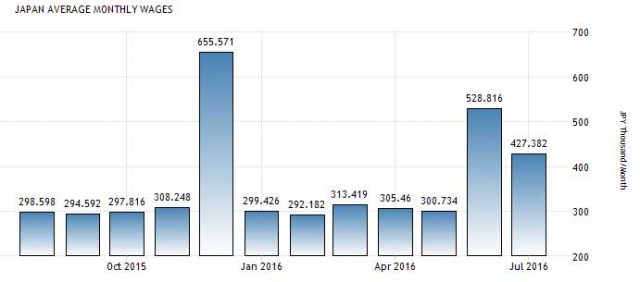
Statistics on the average salary of Japanese people (figures are in thousands of yen)
A little about overtime: For a long time, the practice of “working after work” was widespread. The hardworking Japanese not only did not object to this, but also took the initiative themselves, because the payment for overtime hours was higher than the usual hourly wage, and the positive attitude towards excessive work itself had been formed over the centuries. Not long ago, this topic was once again raised by the Ministry of Health, Labor and Welfare (MHLW - Ministry of Health, Labor, and Welfare), which opposed overwork from the point of view of its harmfulness to the physical and psychological well-being of workers. At the moment, the maximum possible overtime work time is strictly regulated by law.
Table: how much overtime the Japanese can work
| Time interval | Working hours |
| 1 Week | 15 hours |
| 2 weeks | 27 hours |
| 4 weeks | 43 hours |
| 1 calendar month | 45 hours |
| 2 calendar months | 81 hours |
| 3 calendar months | 120 hours |
The norm today is an eight-hour working day with a weekly maximum of forty hours. However, often hardworking Japanese still use the maximum possible number of overtime hours, which is only allowed by law, in order to still at least slightly improve their work performance. This point is one of the most controversial from the point of view of Russian immigrants, since in Russia the attitude towards overtime work is usually completely opposite.
Often the main problem is language. As a rule, employers require knowledge of Japanese at the N2 or N1 level, and some even want to see employees on their staff who speak Japanese no worse than native speakers. Therefore, it will be a big advantage if you start learning the language in your home country. Of course, it is much easier to learn Japanese directly in Japan. This can be done either with the help of private teachers or in numerous institutions. However, before doing this, you need to soberly assess the time you will need to study. Thus, many Russians cannot master the Japanese language for many months and even years. Before leaving for Japan to study the language, take into account the possibility of difficulties, since the state gives you the right to study for as long as it takes, but during this time you will need to live on something.
... Whatever one may say, you need to learn a language in order to find a warm place. And it’s not easy to learn to speak and understand, as well as read and write, preferably without a dictionary. Otherwise, the usual “home-work-home” pattern awaits you, and so on every day with short walks around the area. And you can get this at home without Japan...

Before leaving, be sure to analyze which city in the country is best to go to in your case. The most popular cities among immigrants:
- Tokyo is the capital of the country. It is here that the financial, business, industrial and cultural life of Japan is concentrated;
- Osaka is one of the most attractive cities for immigrants, located on the island of Honshu. The tourism and educational industries are especially developed here. The city is the third largest in terms of population, so you can always find vacancies in the service sector;
- Sapporo is a city on the island of Hokkaido. It is considered the second most important economic, industrial, educational and cultural center of the country;
- Niigata is the largest port city;
- Yokohama is an economically developed city located near the capital;
- Fukuoka is an important industrial center.







